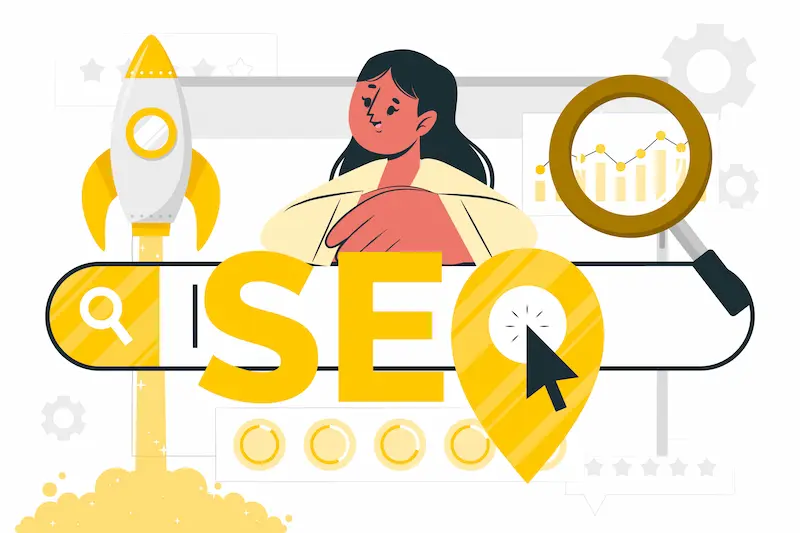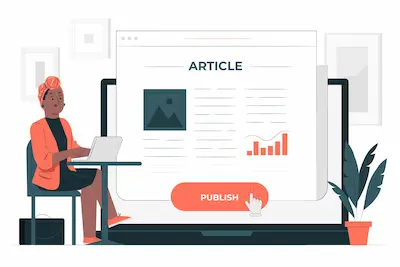
Evolution or Extinction
The Future of SEO
Welcome to the ever-evolving world of SEO! From its humble beginnings to the AI-driven future, SEO has undergone remarkable changes. In this blog post, we'll dive into how voice search, mobile-first indexing, and personalized content are shaping SEO strategies. Join us as we explore the latest trends and technologies that keep your website competitive in this dynamic digital landscape. Let's get started!
Historical SEO Trends
The Birth of SEO
Once upon a time, in the early days of the internet, SEO was born. The early 90s marked the birth of search engines like Archie, and later, giants like Yahoo and Google. SEO, or Search Engine Optimization, started as a simple practice. Webmasters stuffed their pages with keywords to rank higher in search results. It was the Wild West of the digital world, where whoever crammed the most keywords often won the battle for visibility.
In those days, you could easily trick search engines. Just load your page with keywords and voila! Your site shot to the top. It was a time when search engines were quite naive, and the rules of the game were more about quantity than quality. But oh, how things have changed!
The Rise of Algorithm Updates
Fast forward a few years, and Google started to grow smarter. In the early 2000s, Google rolled out its first significant algorithm update, known as the Florida update. This update aimed to reduce the influence of keyword stuffing and spammy tactics. Suddenly, SEO wasn't just about how many keywords you could jam into your content. Quality began to matter more.
The Florida update was a game-changer. It forced website owners to think about content quality and user experience. Over the years, Google continued to refine its algorithms with updates like Panda, Penguin, and Hummingbird. Each update aimed to improve search results by prioritizing high-quality, relevant content over manipulative SEO practices.
You might remember the Panda update of 2011. This update specifically targeted low-quality sites with thin content. It was a wake-up call for many who relied on churning out large volumes of low-value content. Penguin followed in 2012, focusing on punishing sites with manipulative link schemes. Hummingbird, in 2013, emphasized the importance of context and user intent, making searches more intuitive and human-friendly.
The Shift to Mobile and Local SEO
As smartphones became an integral part of our lives, SEO had to adapt once again. The mobile revolution changed how people searched for information. In response, Google introduced the Mobilegeddon update in 2015. This update prioritized mobile-friendly websites, ensuring users had a seamless experience regardless of the device they used.
Mobile-first indexing became the new norm. It meant Google started to index and rank content based on the mobile version of websites. Suddenly, having a responsive design was not just a nice-to-have; it was a must-have. If your site wasn't mobile-friendly, it would struggle to rank well.
Local SEO also gained traction during this time. With more people searching for services "near me," Google My Business listings and local citations became crucial. Optimizing for local search meant your business could show up when someone nearby was looking for what you offered. It was a significant shift, making SEO more personalized and relevant to users' immediate needs.
The Era of Voice Search and AI
Entering the 2020s, SEO took yet another leap forward. The rise of voice search changed the way people interacted with search engines. Devices like Amazon Echo, Google Home, and Apple's Siri meant more users were speaking their queries instead of typing them. This shift had a profound impact on SEO strategies.
Voice search optimization became essential. Queries were now more conversational, and long-tail keywords gained importance. People were asking questions like, "What's the best pizza place near me?" rather than just typing "pizza place". SEO had to evolve to understand and cater to these natural language searches.
Artificial Intelligence (AI) also started playing a significant role in the SEO future. Google's RankBrain, an AI-based system, helped understand search queries better by analyzing the context and user intent. This development meant that content needed to be more comprehensive and relevant to rank well.
The Future of SEO: A Glimpse Ahead
Looking back, the journey of SEO has been nothing short of remarkable. From the early days of keyword stuffing to the sophisticated algorithms we see today, SEO has continually evolved. It's clear that SEO is far from dying. Instead, it's transforming, becoming more nuanced and user-focused.
In the SEO future, we can expect even more exciting developments. AI will continue to advance, making search engines smarter and more intuitive. User experience will remain paramount, with a greater emphasis on high-quality, relevant content. The integration of emerging technologies, like augmented reality and virtual reality, could also reshape the SEO landscape.
Emerging Technologies in SEO
The Rise of Artificial Intelligence
Artificial Intelligence (AI) is revolutionizing the SEO future. Imagine a world where search engines understand not just words, but the intent behind them. AI tools, like Google’s RankBrain, are doing just that. RankBrain uses machine learning to process search queries, ensuring users get the most relevant results.
You might wonder how this affects your SEO strategy. Well, AI means search engines are getting smarter every day. It's not enough to just sprinkle keywords throughout your content. You need to create high-quality, engaging content that answers users’ questions. The better you understand your audience's needs, the better your content will perform.
AI also powers tools like chatbots. These little helpers can answer customer queries instantly, improving user experience on your site. A better user experience often translates to better SEO rankings. So, integrating AI-driven chatbots can be a win-win for both you and your visitors.
Voice Search Optimization
Voice search is another game-changer in the SEO future. With the rise of smart speakers and virtual assistants, more people are using voice commands to search the web. This means your SEO strategy needs to adapt to how people speak, not just how they type.
Think about it: when you use voice search, you’re likely to ask complete questions. Instead of typing “weather New York,” you might say, “What’s the weather like in New York today?” This shift means long-tail keywords are becoming more important. You need to optimize your content for these conversational phrases.
To do this, start by incorporating natural language into your content. Use question-and-answer formats and think about how people talk. Voice search optimization is all about making your content sound like a natural conversation. It’s not just about the keywords anymore; it’s about the context and how well you can match the user’s intent.
The Impact of Mobile-First Indexing
Mobile-first indexing is shaping the SEO future in a big way. Google now primarily uses the mobile version of a site for indexing and ranking. This shift reflects the growing number of users who access the internet via mobile devices.
If your website isn’t mobile-friendly, it could seriously hurt your SEO rankings. But don’t worry, optimizing for mobile-first indexing isn’t as daunting as it sounds. Start with a responsive design that adapts to different screen sizes. Make sure your site loads quickly on mobile devices, as slow load times can drive users away.
Also, pay attention to your site’s navigation. It should be easy for mobile users to find what they’re looking for. Think about touch-friendly buttons and easily readable fonts. Remember, a smooth mobile experience can significantly boost your SEO performance.
Augmented Reality (AR) and Virtual Reality (VR)
Augmented Reality (AR) and Virtual Reality (VR) are not just for gaming anymore; they are becoming important in the SEO future. These technologies offer immersive experiences that can set your content apart. Imagine giving users a virtual tour of your store or an augmented reality preview of a product. This can greatly enhance user engagement.
Search engines love engagement. The longer users stay on your site and interact with your content, the better it is for your SEO. Integrating AR and VR can create these engaging experiences, keeping visitors hooked and improving your SEO metrics.
Implementing AR and VR doesn’t have to be complex. Start small with 360-degree photos or videos. As you get more comfortable, you can explore more advanced applications. These technologies are still emerging, but getting ahead of the curve can give you a competitive edge in the SEO future.
Predictive Analytics
Predictive analytics is another emerging technology shaping the SEO future. By analyzing data, predictive analytics can forecast future trends and user behavior. This means you can stay ahead of the curve and tailor your SEO strategy accordingly.
For example, if predictive analytics show a rising trend in eco-friendly products, you can start creating content around that topic before it becomes saturated. This proactive approach can help you rank higher and attract more visitors.
To get started with predictive analytics, you don’t need to be a data scientist. Many tools and platforms offer user-friendly interfaces that make it easy to interpret data and apply insights to your SEO strategy.
The SEO future is bright and full of exciting technologies. From AI and voice search to mobile-first indexing and beyond, staying updated with these trends can keep your strategy ahead of the curve. Embrace these emerging technologies and watch your SEO efforts thrive in this ever-evolving digital landscape. Remember, the key to success is adapting and innovating with the times. So, get ready to explore these new frontiers and take your SEO game to the next level!
Impact of AI on SEO
AI-Powered Content Creation
Imagine having an assistant that helps you create content optimized for SEO. AI can do just that! Tools like GPT-4, for instance, can generate high-quality content that’s both engaging and optimized. These tools analyze existing content, identify what works, and help you craft posts that rank higher.
Using AI for content creation doesn’t mean you lose the human touch. Instead, it enhances your ability to produce relevant and interesting content. You can use AI to generate ideas, draft articles, and even optimize your content for SEO. It’s like having a smart assistant that ensures your content is always top-notch and ready to perform well in search engines.
Personalization and User Experience
AI is also revolutionizing how we personalize content and enhance user experience. Search engines use AI to analyze user behavior and preferences. This allows them to deliver more personalized search results. If you tailor your content to meet specific user needs, it’s more likely to rank higher.
Think about it: when you search for something, you want the most relevant and personalized results. AI helps search engines deliver just that. For you, this means understanding your audience better. Use data and insights to create content that speaks directly to your users’ needs and preferences. The more personalized your content, the better it will perform in an AI-driven SEO future.
Chatbots and User Engagement
Chatbots, powered by AI, are transforming how we engage with users. These intelligent bots can answer queries, provide recommendations, and even assist with purchases. By integrating chatbots into your website, you can enhance user experience and keep visitors engaged.
Engaged users are more likely to spend time on your site, reducing bounce rates and improving your SEO metrics. Chatbots provide instant responses, making users feel valued and supported. This positive interaction can lead to higher satisfaction and better SEO performance.
Implementing chatbots doesn’t have to be complicated. Many platforms offer easy-to-use solutions that you can integrate with your website. By enhancing user engagement through AI-powered chatbots, you’re not only improving the user experience but also boosting your SEO.
Predictions for SEO's Future
The Importance of User Experience (UX)
User experience (UX) is becoming a critical factor in the SEO future. Search engines are prioritizing websites that offer excellent user experiences. This includes fast load times, easy navigation, and engaging content. A positive UX can lead to longer site visits and lower bounce rates, both of which can improve your SEO rankings.
You can improve UX by focusing on site speed. Slow-loading pages frustrate users and drive them away. Use tools to analyze and optimize your site’s performance. Also, ensure your site’s navigation is intuitive, making it easy for users to find what they’re looking for.
Content is also a key part of UX. Create high-quality, relevant content that answers users’ questions and keeps them engaged. Interactive elements, such as videos and infographics, can enhance the user experience and encourage visitors to spend more time on your site.
The Growth of Local SEO
Local SEO is gaining prominence in the SEO future. With more people searching for services and businesses “near me,” optimizing for local search is essential. This means ensuring your business appears in local search results and on Google Maps.
To optimize for local SEO, start by claiming and verifying your Google My Business listing. Ensure your business information is accurate and complete. Encourage customers to leave reviews, as positive reviews can boost your local rankings. Also, include local keywords in your content to improve visibility in local search results.
Local SEO isn’t just about being found; it’s about being found by the right audience. By focusing on local search optimization, you can attract more relevant traffic and increase your chances of converting visitors into customers.
Enhanced Personalization
Personalization is set to play a significant role in the SEO future. Search engines are increasingly focusing on delivering personalized search results based on user behavior and preferences. This means understanding your audience on a deeper level and tailoring your content to meet their specific needs.
To achieve this, use data and analytics to gain insights into your audience’s behavior. Identify what types of content they engage with and what their preferences are. Use this information to create personalized content that resonates with your audience.
Personalization isn’t just about content; it also involves offering personalized experiences on your website. This can include personalized recommendations, customized landing pages, and targeted marketing messages. By delivering personalized experiences, you’ll enhance user satisfaction and improve your SEO performance.
The SEO future is dynamic and full of exciting possibilities. From voice search and AI integration to mobile-first indexing and enhanced personalization, staying ahead means continually adapting and innovating. Embrace these trends, focus on providing exceptional user experiences, and keep your content relevant and engaging. By doing so, you’ll be well-prepared to navigate the ever-evolving landscape of SEO and achieve long-term success.
FAQs About the Future of SEO
-
How has the role of keywords changed in the SEO future?
Keywords are still important, but their role has evolved significantly. In the early days of SEO, stuffing pages with keywords was a common practice. Now, search engines prioritize high-quality, relevant content over keyword density. It's more about understanding user intent and creating content that answers users' questions effectively. -
What are the most important factors for optimizing for voice search?
Voice search optimization focuses on conversational language and long-tail keywords. When people use voice search, they tend to ask complete questions. To optimize for this, use natural language in your content, incorporate question-and-answer formats, and think about how people speak rather than how they type. -
How does mobile-first indexing impact my website's SEO?
Mobile-first indexing means Google primarily uses the mobile version of your site for indexing and ranking. To ensure your site ranks well, it must be mobile-friendly. This includes having a responsive design, fast load times, and easy navigation. A seamless mobile experience is crucial for good SEO performance. -
What are some practical ways to implement AI in my SEO strategy?
AI can be integrated into your SEO strategy in several ways. AI-powered tools can help with content creation, keyword research, and data analysis. Chatbots powered by AI can enhance user engagement and improve customer service on your site. Using AI-driven analytics can also provide insights into trends and help tailor your content to better meet user needs. -
How can local SEO benefit my business?
Local SEO helps your business appear in local search results and on Google Maps, making it easier for nearby customers to find you. To optimize for local SEO, ensure your Google My Business listing is accurate and complete, encourage customer reviews, and include local keywords in your content. This approach can attract more relevant traffic and increase your chances of converting visitors into customers.







